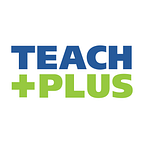Student Voice is Powerful, Let’s Make Sure We Listen
By Sarah Campbell
Going outside in February in Chicago is always risky, but on the Saturday before the municipal elections, there was rain in addition to the typical frigid temperatures and high winds. It was, quite literally, going to rain on our parade. Our parade to the polls, that is. As I helped unload breakfast from the car, I wondered if there would be more than a couple of kids to eat the breakfast. Were students really going to show up to parade to the polls in this weather? And if they did, would they just be doing it for a free breakfast and maybe some extra credit? Then I saw 50 students pile into the room and I knew we had the start of something amazing.
Through my work at Teach Plus, I’ve seen our teachers take on a slew of opportunities in and outside of the classroom, and the undeniable benefits of elevating teacher voice. When I heard that Illinois Policy Fellowship alumna Ashley McCall was taking on a “get out the vote” project, I immediately wanted to help. Using groundwork laid by the youth voice organization Chicago Votes, Ashley started CHI Students Vote, “a coalition of educators, education advocates, and community members helping to remove barriers to voting (such as transportation), and educating students on how to make their voices heard.” Through this work, I’ve watched Ashely use the teacher voice we develop at Teach Plus to elevate something just as powerful: student voice.
Ashley started the morning with voter education. We ran through general questions about the election; the students shot their hands up for every answer. It was clear they did their homework. Not only did they have the answers to the questions, but as we wrote down why we were voting, most of them had thoughtful, compelling reasons to be there. One sign read: “I’m voting because a lot of people gave their lives so I can have the opportunity to.” They spoke clearly and passionately about who they were voting for and why.
These students, along with their teachers, are the ones living the real-life consequences of who we vote into office. They are the ones who know what is happening in schools now and what they need to make their schools better in the future. We must listen to them.
We’ve known since the Tinker v. Des Moines Community Independent School District decision that students have a constitutional right to speak up for issues that they care about. The Supreme Court decision is 50 years old, but you don’t have to look far to see the parallels to students today who are just as passionate about current events.
We all hear sentiments about how young people don’t care about elections or politics, and so they don’t show up to vote. While I hope that turnout continues to increase, only using this measure ignores the barriers many of our students, face to get to the polls, like transportation. Instead of accusing the students of not caring, I challenge us all to remove these barriers, like Ashley has worked to do.
This sentiment also ignores the powerful ways students use their voices outside of voting. Groups like March for our Lives continue to leverage social media and other advocacy routes to put pressure on legislators. A group of students I’m working with now is developing ways to survey teachers and students about education issues so they can share the ideas with mayoral candidates. There are countless examples of student voice organizations like these across the country.
The next time I am confronted by someone who challenges the seriousness of students’ voice, I look forward to telling them about the time when 50 high school students showed up at 8 am on a Saturday morning to talk about the election, and who then marched blocks in the freezing rain to vote for the first time in a local election. I’d argue that’s pretty serious. Plus, if we continue to doubt their seriousness, how can we expect them to keep showing up to the polls? Let’s encourage their voices by acknowledging how powerful they can be―and by supporting them in their effort to be heard.
Sarah Campbell is Senior National Special Projects Associate at Teach Plus.
